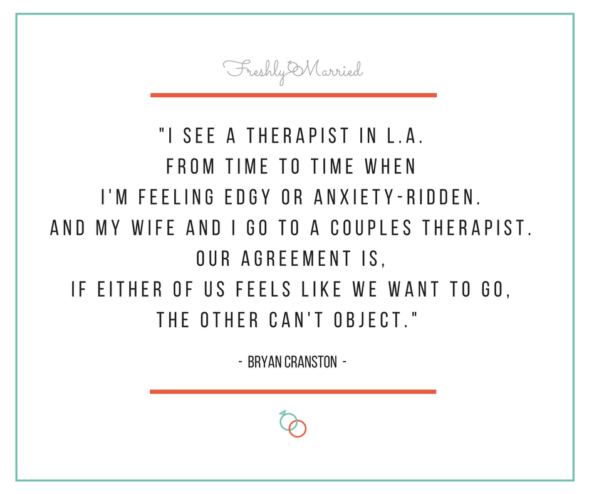3 Ways Couples Therapy Can Empower Marriage, Even Before The First Session
By Amy Miller
One day I was flipping through an article on long-lasting celebrity couples, and each couple said something that has helped them be successful in their marriage. Some of the reasons were good, but this one by actor Bryan Cranston (from TV shows Malcolm in the Middle, and Breaking Bad) and his wife of 27 years stuck out to me.

Whether or not couples therapy is successful for them (it seems like it is since they are still married), this statement is so powerful! I’m going to tell you why and provide three ways that couples therapy can be empowering to marriage, even before the first session begins!
1. They recognize they can’t do it on their own.
Sometimes we need a third party to talk to, to help us understand each other’s points of view and direct us to overcome these struggles to be a happier and healthier couple. I think the hardest part of seeing a therapist is actually mentally accepting the help in the first place! It’s a humbling experience, but I also think the humility allows you to feel hope. Which is important because a common feeling when contemplating counseling is this feeling of hopelessness because they see counseling as the last resort to fixing their relationship. I can understand that thinking, but at the same time, would you rather be in denial and continue to be unhappy, or would you like to turn that “rock bottom” feeling around by doing something about it?
2. I love that they respect the feelings of each other, that if one is wanting to go see a therapist, the other agrees to go, too.
That’s so powerful for a couple, in my opinion! Especially because when you go into couples counseling with a “team” mindset in supporting one another, I think you’re going to come out with more success! This isn’t always the case, though. Usually, one spouse is dreading to go for reasons like worrying about what others might think, not believing that therapy can help, or most commonly they don’t think their marriage needs help. Fairly understandable reasons to be hesitant about it. However, if your spouse is suggesting seeing a therapist because something is off even if you don’t see it, I believe that agreeing to go shows a deeper level of commitment. It shows that you are willing to do something out of your comfort zone because you believe in your marriage. Just being willing to go to couples therapy gives your marriage so much power even before your first session!
3. This is admitting they go to a therapist, which is so hard to come out and say to others.
Especially with the stigma society has created around it that has a way of making us feel embarrassed or weak because we maybe aren’t as successful as other couples who don’t see a therapist. I understand. You don’t want other people to know that your relationship feels at an impasse so much that you need help getting through. You don’t want people to look down on you because you can’t make the perfect marriage work. Well is there really a reason you would need to share that information with others? Probably to only a few close friends or family, if necessary. I address this feeling in the blog post about “9 Misconceptions About Therapy.”

The best scenario for couples therapy
I truly admire this couple for talking about couples therapy, and sharing their experience! I just plain admire couples who go to couples therapy whether they tell people or not because it shows you haven’t given up yet. Sadly, some couples wait to see a therapist until they have lost all motivation for making it work. And at that point, therapy can only do so much.
The way I see couples therapy working out the best is basically summed up in those points made above: realizing and accepting that your relationship could be better and you need some professional help doing that and having a willing attitude to work together at making your marriage work. I believe these changes to a mindset allow a couple to be on their way to success in therapy!
If you would like to read my experiences seeing a therapist individually, go to this blog post “Seeing a Therapist: My Own Experiences.”
Resource: Interview with Rolling Stone